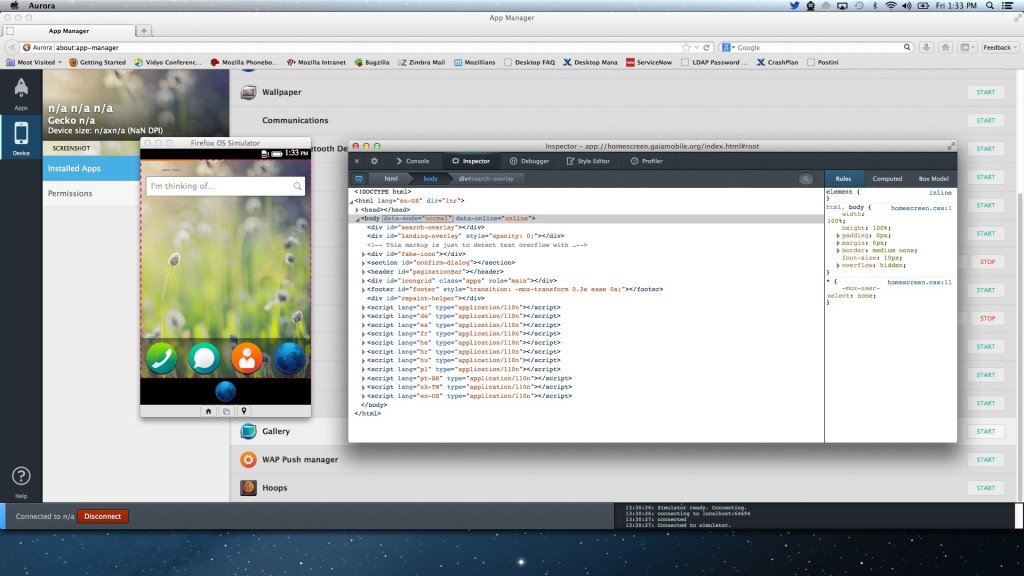Mozilla Firefox OS Releases WebIDE
Firefox’s recent update should come as a surprise to many users and developers, as the Nightly release channel now allows them to test WebIDE, a development environment for HTML5 apps that are built into the browser, a move that is hot on the heels of their recent collaborative effort with Google’s Android.
For long-time Firefox users, Bespin, a project Mozilla undertook in the same vein, some time ago would be fresh in your memory. Bespin, tried to build a code editor into the browser, but like most initial efforts did not work out the way Mozilla envisioned it. But instead of chucking the idea down into the trash can of failed efforts, Bespin now forms the core of Cloud9IDE, a similar improvement. Being a project in its initial stages, the WebIDE betters Bespin in terms of its ambition to be the first browser based IDE.

Christian Heilmann, a developer with Mozilla explained that WebIDE is not only a code editor that is built into the browser, but includes a set of tools that creates responsive apps for the desktop and the mobile platform. This is a subtle move on Mozilla’s part, they’re trying to market the Firefox OS for phones relentlessly to make it at least the third popular OS for smart phones. Not withstanding this act of marketing, users will now possess a built-in simulator and a suite of tools that not only allow you to test apps on a device but also build it on the same device itself.
WebIDE comes with an app that helps developers understand how it works, thus giving them a starting point for their own work. Mozilla simplified it quite well for developers using just a few clicks to get started on a new web app right in the browser itself. The sample they provide also offers new users with all code needed so that every time the code it edited and reloaded, WebIDE will validate the changes and repackage the code.
An interesting factor Heilmann pointed out is the fact that there are not many IDEs out there that offer a built-in code editor, and even if there are mock-ups, they are not the right tools to write the code for web apps and the task of configuring them can really be a headache. The challenges with creating such web apps may be challenging for new developers and more often than not this can lead to a premature death of the web app. The inclusion of the built-in code editor and the suite of tools provided by WebIDE is probably the best feature of the IDE that will attract interest from techies.
David Camp who is the director of Mozilla’s developer tools, also highlighted the fact that although WebIDE was based on CodeMirror and Bespin, since they share the same tern.js code analysis framework, developers can easily ignore the effort Firefox has put in and choose to work with the framework they personally choose to work with. With the built-in editor turned off, developers can still use the interface to manage run times and validate the apps. WebIDE plays a role that caters to three different positions. WebIDE can simply look for changes, allow developers to use a feature that is yet-to-be-released, a command-line API or simply integrate third party code editor vendors to integrate with Mozilla to work on these web apps.
WebIDE, is now the focus of serious hard work, with attempts to integrate it with Firefox’s Remote Debugging Protocol. The aim of the integration process is to allow the developers to test web apps with ease after they create them with ease, after all they have been created on the mobile or desktop based browser. The best part of the entire deal is the fact that they do not need an emulator, allowing testing and editing to happen in real-time. An optimistic Camp, hopes that the protocol adapter that currently works with Firefox on the desktop and Android, will try to extend this across all platforms including Chrome for Android and Safari on iOS.
If you are a developer and want to try this feature, install Firefox Nightly and try about:config. Once there, set devtools.webide.enabled to true, although Mozilla plans on enabling it to by default by their next stable release which is still a few months away.


